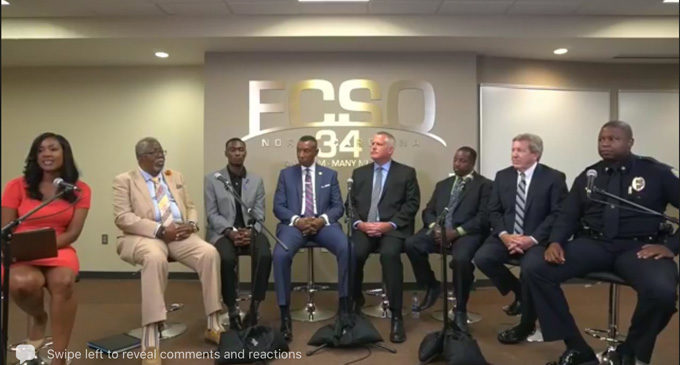FCSO hosts roundtable to mark one-year anniversary of George Floyd’s murder
Earlier this week the Forsyth County Sheriff’s Office hosted the “Black, White, and Blue: Building Better Communities through Conversations” roundtable.

On Monday, May 25, George Floyd, a Black man, allegedly tried to use a counterfeit $20 bill at a convenience store. Once police were on the scene, Floyd was asked to exit his vehicle, at which time officers say he started to resist. Video footage recorded by several people on the scene shows Floyd in handcuffs, face down on the ground, with Derek Chauvin, a white police officer with the Minneapolis Police Department, literally taking a knee on the back of his neck. In the video footage, Floyd can be heard pleading with Chauvin to not kill him and telling him “I can’t breathe.”
Civilians on the video footage can be heard begging with Chauvin to remove his knee from Floyd’s neck. But for nine minutes, Derek Chauvin, the officer whose primary responsibilities are to protect and serve, kept his knee on Floyd’s neck, while two other officers helped hold Floyd down and another watched, while his colleagues killed a man over $20.
Floyd’s death sparked peaceful protests, riots, and calls for police reform and defunding across the country. Earlier this week, exactly one year to the day of Floyd’s death, Sheriff Bobby Kimbrough and the Forsyth County Sheriff’s Office invited representatives from the Winston-Salem Police Department (WSPD), local clergy, and representatives from the community to discuss the impact of Floyd’s death, the future of policing across the country, and several other pressing issues, including the recent rise in gun violence.
Joining Sheriff Kimbrough for the roundtable discussion were: Walter C. Holton, former U.S. attorney for the Middle District of N.C.; Assistant Chief Williams with the WSPD; Bishop Todd Fulton, former president of the Ministers’ Conference of Winston-Salem and Vicinity; Al Jabbar, president of the Winston-Salem NAACP; Frankie Gist, community activist; and Scott Gerlicher, who recently retired from the Minneapolis Police Department.
To jump-start the conversation, WXII 12 news anchor Talitha Vickers, who served as the moderator for the roundtable discussion, asked Gerlicher what it was like to be in Minneapolis last year and how George Floyd’s death impacted the country.
During the investigation into Floyd’s death, Gerlicher, who has more than 30 years of experience working in law enforcement, served as the Special Operations and Intelligence Division Commander. He said Floyd’s death led to a push that he hopes will bring about real change in law enforcement.
“Never in my wildest dreams did I ever imagine that my community in Minneapolis and my police department would be, as you say, the epicenter of what was both a significant incident in our nation’s history and also change,” Gerlicher said. “I think of the incident with George Floyd, we’re starting to see some of that change.”
When asked what needs to be done to bring about real change, Gerlicher said we need to take a hard look at some of the policies within law enforcement. “I think we need to maintain closer community connections and then also I think we need to take a good look at law enforcement and how we police throughout this country,” he continued.
“I will maintain that that particular incident does not define the Minneapolis Police Department, nor does it define law enforcement … there is a lot of great things going on in law enforcement, but I think there is a need for a much closer look at how we’re doing policing out there, what the training is both before the police academy and after the police academy.”
Gist, who is the founder of HOPE Dealers Outreach, a local grassroots organization geared toward uplifting communities in need, said law enforcement and the community have to work together.
“Accountability is very important in law enforcement and the community as well,” Gist said. “We all have to hold ourselves accountable and we do have to work together in order to tackle these issues, because if one side is going against the other, we’ll never be able to bridge that gap.”
The “Black, White, and Blue: Building Better Communities through Conversations” roundtable can be viewed in its entirety by visiting the Forsyth County Sheriff’s Office Facebook page.










